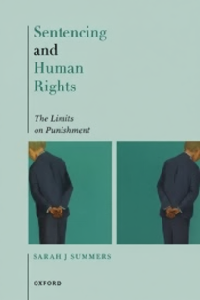Sentencing and Human Rights: The Limits on Punishment
By Sarah J Summers.
From the introduction:
Sentencing law and theory is closely bound up with the justification of punishment. 1 It is thus unsurprising that sentencing theory is generally perceived as falling squarely within the domain of moral philosophy. 2 Much of the debate has focused on whether retribution or consequentialist notions of deterrence or rehabilitation should serve as the principal aim on which the sentencing system is based. There are numerous articles by proponents of the various theories explaining why their theory should provide the primary basis for the determination of the sentence. 3 The importance of the moral philosophical discussion transcends national boundaries. Despite considerable diversity in the legal cultures and traditions of the various legal systems, ‘[p]rinciples of uniformity and retributive proportionality are now recognised to some extent in almost all systems, but sentences in these systems are also designed to prevent crime by means of deterrence, incapacitation and rehabilitation’.4 Whereas broadly ‘correctionalist’ accounts of punishment underpinned the penal welfare model of punishment for much of the twentieth century, 5 the ‘just deserts’ movement 6 of the 1980s was in line with a transfer of focus away from the individualized treatment of offenders and towards a vision of punishment which not only favoured a more standardized approach to the treatment of offenders, but which also expressly legitimized retributivist penalties and practices…..
London Oxford. 2022. 280p.


